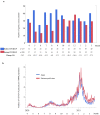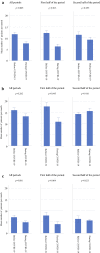Impact of the first era of the coronavirus disease 2019 pandemic on gastric cancer patients: a single-institutional analysis in Japan
- PMID: 35344118
- PMCID: PMC8958809
- DOI: 10.1007/s10147-022-02142-8
Impact of the first era of the coronavirus disease 2019 pandemic on gastric cancer patients: a single-institutional analysis in Japan
Abstract
Background: Little is known about the disadvantages of the coronavirus disease 2019 (COVID-19) pandemic in patients with gastric cancer. This study aimed to examine the negative impact of the COVID-19 pandemic on patients with gastric cancer in the first era in Japan.
Methods: This retrospective study included 725 patients diagnosed with gastric cancer who visited our hospital between April 2019 and March 2021. The number of patients and their characteristics before and during the COVID-19 pandemic were compared.
Results: The number of patients diagnosed with gastric cancer during the COVID-19 pandemic decreased by 26.2% (from 417 to 308; p = 0.013) compared to that before the COVID-19 pandemic. There was a significant decrease in cStage I cancer and an increase in cStage III cancer (p = 0.004). Patients were often symptomatic (p = 0.029), especially those with stenosis-related symptoms (p < 0.001) and longer symptom duration (p < 0.001). The number of endoscopic resections was decreased by 34.8% (p = 0.005). The number of total gastrectomy was higher than that of partial gastrectomy (p = 0.021). The median time to treatment was significantly shorter (p < 0.001).
Conclusions: In Japan, delays diagnosing patients with gastric cancer, probably due to refraining from consultation, may have resulted in an increase in the diagnosis of advanced-stage cancer. Moreover, an increasing proportion of patients required more invasive gastrectomy. Therefore, it may be necessary to educate patients not to refrain from consultation, even during the COVID-19 pandemic, as it can have a negative impact on treatment, policy decision, and prognosis of gastric cancer.
Keywords: COVID-19; Coronavirus; Gastric cancer.
© 2022. The Author(s) under exclusive licence to Japan Society of Clinical Oncology.
Conflict of interest statement
The authors declare that they have no conflict of interest.
Figures




Similar articles
-
Consequences of the COVID-19 pandemic on the diagnosis and treatment of gastric cancer in referral centers in Italy.Tumori. 2023 Feb;109(1):121-128. doi: 10.1177/03008916211072586. Epub 2022 Feb 13. Tumori. 2023. PMID: 35152794 Free PMC article.
-
Impact of the COVID-19 pandemic on gastric surgery in Japan: A nationwide study using interrupted time-series analyses.J Gastroenterol Hepatol. 2024 Jul;39(7):1277-1284. doi: 10.1111/jgh.16533. Epub 2024 Mar 7. J Gastroenterol Hepatol. 2024. PMID: 38454806
-
Gastric cancer diagnosis and staging in coronavirus disease 2019 (Covid-19) pandemic.Ann Ital Chir. 2023;94:203-208. Ann Ital Chir. 2023. PMID: 36606448
-
Travel-related control measures to contain the COVID-19 pandemic: a rapid review.Cochrane Database Syst Rev. 2020 Oct 5;10:CD013717. doi: 10.1002/14651858.CD013717. Cochrane Database Syst Rev. 2020. Update in: Cochrane Database Syst Rev. 2021 Mar 25;3:CD013717. doi: 10.1002/14651858.CD013717.pub2. PMID: 33502002 Updated.
-
Psychiatric and neuropsychiatric presentations associated with severe coronavirus infections: a systematic review and meta-analysis with comparison to the COVID-19 pandemic.Lancet Psychiatry. 2020 Jul;7(7):611-627. doi: 10.1016/S2215-0366(20)30203-0. Epub 2020 May 18. Lancet Psychiatry. 2020. PMID: 32437679 Free PMC article.
Cited by
-
An approach to COVID‑19 and oncology: From impact, staging and management to vaccine outcomes in cancer patients: A systematic review and meta‑analysis.Exp Ther Med. 2024 Dec 23;29(2):37. doi: 10.3892/etm.2024.12787. eCollection 2025 Feb. Exp Ther Med. 2024. PMID: 39776889 Free PMC article.
-
Incidence trends of gastric cancer in the United States over 2000-2020: A population-based analysis.PLoS One. 2024 Sep 25;19(9):e0310040. doi: 10.1371/journal.pone.0310040. eCollection 2024. PLoS One. 2024. PMID: 39321169 Free PMC article.
-
The impact of COVID-19 pandemic on head and neck cancer diagnosis and treatment.J Dent Sci. 2024 Jul;19(3):1620-1627. doi: 10.1016/j.jds.2023.12.005. Epub 2023 Dec 16. J Dent Sci. 2024. PMID: 39035338 Free PMC article.
-
The Challenges of Gastric Cancer Surgery during the COVID-19 Pandemic.Healthcare (Basel). 2023 Jun 30;11(13):1903. doi: 10.3390/healthcare11131903. Healthcare (Basel). 2023. PMID: 37444737 Free PMC article.
-
The impact of COVID-19 for postoperative outcomes using a nationwide Japanese database of patients undergoing distal gastrectomy for gastric cancer.Ann Gastroenterol Surg. 2023 May 4;7(6):887-895. doi: 10.1002/ags3.12690. eCollection 2023 Nov. Ann Gastroenterol Surg. 2023. PMID: 37927923 Free PMC article.
References
-
- Sung H, Ferlay J, Siegel RL, et al. Global cancer statistics 2020: GLOBOCAN estimates of incidence and mortality worldwide for 36 cancers in 185 Countries. CA: Cancer J Clin. 2021;71:209–249. - PubMed
-
- Shiotani A. Gastric cancer. Singapore: Springer; 2018.
MeSH terms
LinkOut - more resources
Full Text Sources
Medical
Miscellaneous

